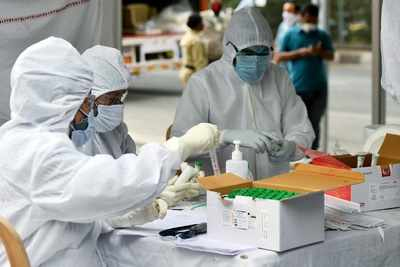Dr Shashi S Sudhan, Lt. Col Inam Danish Khan
“Covid-19 pandemic response has mandated testing in mammoth proportions through an extremely sophisticated RTPCR tests in an unprecedented scale not known earlier to mankind worldwide. With more than a lakh Covid-19 tests being conducted in India in approximately 1000 labs, total quality management is mandated during testing protocol.“The gold standard Covid-19 test, real-time reverse transcriptase polymerase chain reaction (RTPCR) is more of a research tool rather than being a robust diagnostic test. Sometimes, testing process may face human errors if omission or commission leading to high or low positivity, missed critical testing steps, cross contamination, kit based variations leading to false negativity, false positivity, variable reproducibility and confidence in the test.
Quality assurance is dependent on preanalytical, analytical postanalytical variables. Preanalytical variables include quality of sample. Sample quality reduces due to variable viral shedding, improper collection due to patient condition or cooperation during collection. Sample transport and storage requires cold chain which many also affect quality of test.
Analytical variables include sample identification, RNA Extraction, mastermixing and amplification. Sometimes samples are not labelled properly after collection which can lead to errors. RNA Extraction is the most risky step as lab personnel may get infected. Mastermixing critically defines the outcome of the test. Both RNA Extraction and mastermixing in RTPCR are technician intensive highly sophisticated procedures wherein pipetting errors may lead to procedural omission or cross contamination.
Post analytical variables include interpretation of test based on amplification of genes which is dependent on both the process and the kits used. Different kits have different sensitivity, specificity, positive predictive value, negative predictive value, reproducibility which affect the outcome of the test. Targeted genes may be mutated, repressed, over expressed or may get inhibited in multiplex RTPCR. Further since four genes E, RDRP, ORF and N/N2 are being targeted for testing, the variability of test results are four folds.
High throughput Covid-19 testing with thousands of tests per day within a short time may lead to errors during sample identification, RNA Extraction, mastermixing, RTPCR and post analytical interpretation. RTPCR test procedure has a sensitivity of 70-90% despite being the gold standard.
Covid-19 testing is a resource intensive procedure mandating sophisticated equipment, high quality lab infrastructure, sterilisation and fumigation protocols, robust quality control during all processes, expert lab technicians and lab scientists for optimal outcome.
Currently, labs are following internal quality assurance and Indian Council of Medical Research has instituted external quality assurance programs but there is a scope of improvement at every step.
The introduction of antigen and antibody based tests may promote frugal point of care testing however continue to face quality control issues and have to be confirmed by RTPCR in early phase of the disease. “A robust testing policy framework, capacity enhancement, meticulous implementation and critical communication with all stakeholders is the need of the hour for optimizer COVID-19 testing worldwide.
(The authors are HoD Microbiology GMC Jammu & Associate Professor Microbiology Command Hospital Udhampur)
feedbackexcelsior@gmail.com
Trending Now
E-Paper


